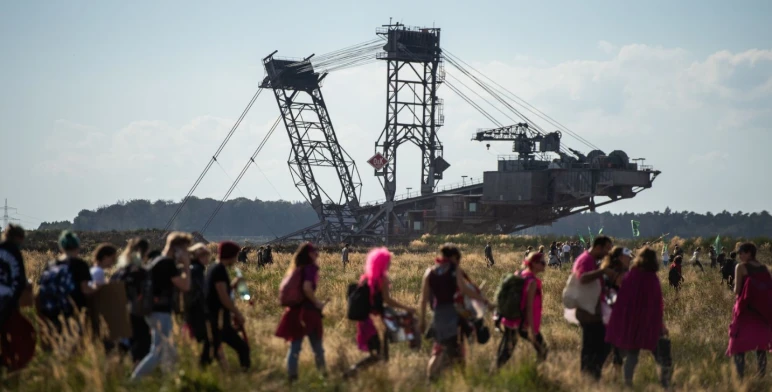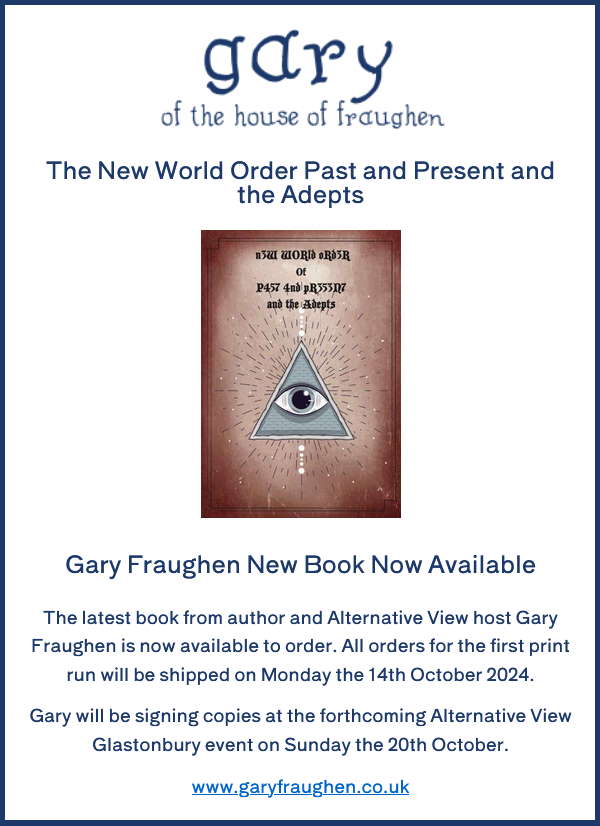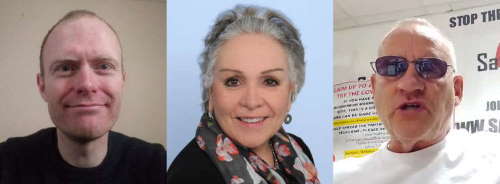Life philosophy: against the destructive will of Mammon
Mon 2:37 pm +01:00, 21 Oct 2024
by Paul Cudenec
Source: https://winteroak.org.uk/2024/10/21/life-philosophy-against-the-destructive-will-of-mammon/
It is today not considered possible by our culture for a sane and serious person to be entirely opposed to the modern world, to its infrastructure and to its thinking.
So many intellectual and cultural taboos have been built to block such a perspective from being voiced and shared, that it has become more or less inaudible and invisible.
Even – or should I say especially? – the so-called environmentalist movement works hard to banish any such worldview, constantly repeating the lies that technology is neutral, that development can be sustainable, that economic growth can be green.
This has not always been the case though, and – before the disaster of Adolf Hitler’s Third Reich – there was an important wave of anti-industrial feeling in Germany.
Explains Gilbert Merlio: “In the last quarter of the 19th century, criticism of modern civilization was fuelled by a rapid and brutal industrial revolution.

“Alongside anti-Enlightenment traditionalists there emerged particularly here a “life philosophy” (Lebensphilosophie) which saw spirit or reason as destructive of the ‘world of life’.
“In parallel there appeared in Germanic lands a nebula of social movements which voiced their protest against the harm caused by industrialisation”. [1]
Merlio adds that Ludwig Klages, whose ideas I presented in my last two essays, was part of that tradition and indeed was the participant “who expressed with the most vigour the anti-rationalism and the hatred of progress that all shared”. [2]
In his 2013 book on Klages, Nitzan Lebovic charts the evolution of the philosopher’s anti-industrial outlook.
He says that initially “Klages’s voyage to the end of the night did not go beyond a metaphorical view of decline, not much different from the familiar fin-de-siecle atmosphere of a world rotten to the core and in need of revolutionary change”. [3]
“From 1896 onward, he wrote a number of poems, gathered and titled ‘Runen‘ (runes), literally a reference to old Nordic alliterative dialects, but which he often also used as an allusion to ‘Ruinen‘ (ruins).

“These allusions convey the destruction of reality and, more than that, the destruction of signification as a whole. Light gives way to the long night of chaos; reason is destroyed with its names and comprehension.
“The modern world becomes a place devoid of interpretation and interpretability. In a
place where nature has been destroyed by the polluting force of modernity, there is no more true signification: when ‘the fog rises, the world is far away’”. [4]
“During the 1920s Lebensphilosophie became a political philosophy that resisted all political systems. It used its radical potential, as one neo-Kantian critic put it, ‘to overcome every element of thinking that has served philosophers up to now’”. [5]
The political aspects of Klages’s thought were, of course, closely enmeshed with the philosophical aspects described in my previous article.
Thus the narrow, egotistical “spirit” that he identifies as the enemy of true soul is at the core of the threat facing us and our world.
Merlio explains that, for Klages, “when spirit frees itself, its reifying action, which sees nature only as rationally-exploitable matter, cuts human beings off from their cosmic roots and becomes dangerous for the species. This is what is happening in modern industrial civilization”. [6]
Klages himself writes: “Who could still doubt that a curse is lashing down on humankind and, like an insatiable moloch, swallowing humankind’s images of itself, the gifts to its most divine hours!” [7]
Merlio says that for Klages our tragedy is “a tragedy of uprooting, with the links broken between human beings and the maternal earth”. [8]
From this perspective, he adds, all that is left for the degraded individual is the bread and circuses of industrial civilization – “Progress alienates everything, both nature and humankind”. [9]
As I mentioned in the first of these essays, Klages was well aware of the financial forces lurking behind the slaughter of the First World War.
Even at the time, in 1915, he saw through the deluded rhetoric of those who imagined that there was something noble to be found in that murderous industrial-militarist nightmare.
In response to a poem embracing the war by the Austrian writer, Erwin Guido Kolbenheyer (1878-1962), Klages declares: “No ‘gods’ are present in this war, and never before have ‘gods’ drunk blood in such a way”. [10]
For Klages, modern warfare is just another aspect of the reduction and mechanization of human beings under the industrial system and he reflects that “nobody can foresee whether a completely mechanized humankind will last for decades or for centuries”. [11]
The work in which Klages most clearly sets out his critique of the modern machine-world is Mensch und Erde – Humankind and Earth.
This was originally a speech he wrote for a gathering of young people in the Wandervogel movement, which took place at Hohe Meissner in Hessen on October 11 and 12, 1913.

Writes Lebovic: “This coalition of youth movements pleading for a return to nature, freedom, and emancipation from the norms of a declining bourgeoisie greatly influenced Klages.
“And, contrary to some scholarly evaluations, the liberal segments as well as the nationalistic segments of the youth movement immediately embraced Klages’s ideas”. [12]
“The youth movement was for him another expression of radical thinking, propelled into existence by the decline of the state.
“In 1913 Klages still thought about the movement as a vehicle for his philosophy, not as a political phenomenon”. [13]
Lebovic says the meeting at Hohe Meissner, at which Klages’s message was read out, became one of the most important moments in the German revolt against the modern world.
“It was there that the notion of industrial progress was challenged most forcefully, and there that an imminent and radical change seemed most compellingly announced”. [14]
He adds that, for Lebensphilosopher August Messer, the most urgent message of the youth movements was “Lebensreform, the admiration of nature and its symbols, the emphasis on the organic, the contempt for materialism and scientific rationalism”. [15]
In the speech, later turned into a widely-read book, Klages warns of “the terrible consequences caused by the dominant doctrine of ‘progress’”. [16]
He looks back to our traditional relationship with nature, pointing out: “When the Greeks built a bridge across a river, they begged forgiveness of the god of the river for this initiative and offered him sacrificial drinks; the sacrilegious felling of trees was punished with blood in ancient Germany”. [17]
But now “a devastating orgy with no equal has taken hold of humankind, with ‘civilization’ seeming to have an unquenchable thirst for murder and its deadly breath withering the abundance of the Earth. These, then, are the fruits of ‘progress’!”. [18]
“The connection between human creation and the Earth has been broken, the authentic song of the landscape has been wiped out for centuries, perhaps even for ever.
“These same railways, telegraph wires and high-voltage cables traverse, with crude straightness, forest and mountain ridge, here as in the Indies, in Egypt, in Australia, in America”. [19]
Alongside this annihilation of natural beauty, there has been an vicious assault on human living, says Klages.
“What remains of the community festivals and sacred customs, that mighty wellspring which for a thousand years inspired myth and poetry?
“What remains of the disconcerting richness of the traditions by which each people allows the expression of its essence, blended with the image of the landscape?
“What remains indeed of the folk song, that ancient and ever-new treasure which harbours, and mellows under its silver veil, the entire destiny of humankind’s becoming and passing?” [20] 
“Most people do not live, they merely exist, wearing themselves out as slaves of ‘work’ like machines in the service of big factories, blindly relying on the numerical delirium of stocks and foundations as slaves of money, to end up as slaves to the intoxicating distractions of the city”. [21]
“Without doubt, we are in the era of the decline of the soul“. [22]
Klages says that any criticism of this unfolding catastrophe is brushed aside with talk of civilizational advance.
“We are not mistaken in suspecting ‘progress’ of having an absurd appetite for power and we see that the injurious insanity is not without method.
“Under cover of ‘utility’, of ‘economic development’, of ‘culture’, it in fact aims at the destruction of life.
“It affects it in all its manifestations, by clear-cutting forests, by wiping species of animals off the map, by exterminating primitive peoples, by covering and disfiguring the landscape with the glaze of civilization…
“And at its service is the whole of Technik and the far vaster sphere of science”. [23]
Klages says it is obvious that modern advances in physics and chemistry “serve only Capital” [24] and that the same seems to be true in other fields of learning.
He warns of a commanding will “which has sacrificed the radiant chromatic richness of the values of the soul – blood, beauty, dignity, ardour, grace, warmth, maternity – to the conquering value of this conceited power which finds a way to incarnate itself in a measurable way through the possession of money”. [25]
Klages says that the word “mammonism” has been coined to describe this phenomenon, but “only a few people have become aware of the real existence of this Mammon which is taking hold of humankind as a tool with which to eliminate every form of terrestrial life”. [26]
The life philosopher issues the same powerful warning in other works.
In The Spirit as Adversary of the Soul, he writes that “the earth gives off smoke as never before from the blood of the slain, and all that is apelike struts with the spoils plundered from the shattered temple of life”. [27]
And in Language as the Source of Psychology he is even clearer as to what he regards as driving this all-out assault on the living.
“The will that emancipates itself from life, and imperiously enslaves it, brings forth evil (the despicable, the satanic), and the hunger for power that accompanies such a formation of the will in the personal ego – before the will has extinguished the life of its carrier and thereby, of course, itself – is the mask, grown into the flesh of the personality and deceiving it, the mask of a hatred that aims ultimately at the destruction of the world”. [28]
It is not hard to grasp why, as we saw in the first essay in this trilogy, Klages’s thinking was not appreciated by a Nazi regime whose murderous industrial frenzy was driven by the force against which he is warning us.
It is also not hard to understand why his thinking is not appreciated by our contemporary system, which shares the very same traits.
Contemplating the way in which Klages and his once-influential ideas have today pretty much disappeared from cultural view, Paul Bishop comments: “It was academic-politically and intellectual-strategically opportune for too many to allow Klages simply to fade away of his own accord.
“For he was simply too radical, too utterly opposed to modernity, and too consistent in his critique, to be a successful figure in the post-War environment”. [29]
“It strikes me as, in a way, a kind of confirmation of the validity of some of Klages’s central arguments that today he is either attacked or ignored…
“One would expect any system to try and neutralise its critics by ignoring, vilifying, or otherwise seeking to dispose of them”. [30]
The great irony, of course, is that the cheerleaders for the industrial system who vilify Klages and his ideas, largely do so by trying to associate him with a previous short-lived manifestation of that same industrial system!
My aim in the 2018 article [31] that I mentioned in the opening essay on Klages was to expose this ideological dirty trick, which is designed to make it impossible to express opposition to the dark and destructive evil of “progress” and “development”.
I agree with Bishop regarding the importance of making available “the immense philosophical resource of Klagesian thinking” [32] to counter this deceitful manipulation.
Moreover, in my various books and on the organic radicals website, I have been trying to piece back together a tradition of nature-thinking and rooted resistance to power and Technik that the system has long tried to consign to the Orwellian memory hole.
I would invite others to join me and help build an authentic new 21st century life philosophy that can inform and inspire our urgently-needed resistance to the global rule of Mammon.
(The orgrad site now includes a profile of Klages based on these essays)
[Audio version]See also:
Life philosophy: beyond left and right
Life philosophy: soul, rhythm, magic and love

[1] Gilbert Merlio, ‘Préface’, Ludwig Klages, L’Homme et la terre (Mensch und Erde), trad. Christophe Lucchese (RN Editions, 2016), p. 8. Quotations from this book are my own translations from French.
[2] Merlio, p. 10.
[3] Nitzan Lebovic, The Philosophy of Life and Death: Ludwig Klages and the Rise of a Nazi Biopolitics (New York: Palgrave Macmillan, 2013), p. 64.
[4] Ludwig Klages, Rhythmen und Runen, Nachlass herausgegeben von ihm selbst (Leipzig: Johann Ambrosius Barth, 1944), p. 227, Lebovic, p. 74.
[5] Heinrich Rickert, Die Philosophie des Lebens: Darstellung und Kritik der philosophischen Modestromungen unserer Zeit (Tubingen: J. C. B. Mohr Verlag, 1920), p. 16, Lebovic p. 128.
[6] Merlio, pp. 10-11.
[7] Klages, Rythmen und Runen, p. 528, Paul Bishop, Ludwig Klages and the Philosophy of Life: A Vitalist Toolkit (Abingdon/New York: Routledge, 2018), p. 36.
[8] Merlio , p. 19.
[9] Merlio, p. 18.
[10] Ludwig Klages, Letter of January 11, 1915, Hans Eggert Schröder, Ludwig Klages 1872-1956: Centenar-Ausstellung 1972 (Bonn: Bouvier Verlag Herbert Grundmann, 1972), p. 68, Bishop, p. 15.
[11] Ludwig Klages, Die Grundlagen der Charakterkunde, Sämtliche Werke 4, ed. Ernst Frauchiger, Gerhard Funke, Karl J. Groffmann, Robert Heiss and Hans Eggert Schröder, 9 vols (Bonn: Bouvier, 1964-1992), p. 408, Bishop, p. 96.
[12] Lebovic, p. 85.
[13] Lebovic, p. 87.
[14] Lebovic, p. 89.
[15] Ibid.
[16] Klages, L’Homme et La Terre, p. 30.
[17] Klages, L’Homme et La Terre, pp. 59-60.
[18] Klages, L’Homme et La Terre, pp. 39-40.
[19] Klages, L’Homme et La Terre, p. 41.
[20] Klages, L’Homme et La Terre, pp. 45-46.
[21] Klages, L’Homme et La Terre, pp. 48-49.
[22] Klages, L’Homme et La Terre, p. 47.
[23] Klages, L’Homme et La Terre, p. 44.
[24] Klages, L’Homme et La Terre, p. 53.
[25] Klages, L’Homme et La Terre, pp. 53-54.
[26] Klages, L’Homme et La Terre, p. 54.
[27] Ludwig Klages, Der Geist als Widersacher der Seele, 6th edition (Bonn: Bouvier Verlag Herbert Grundmann, 1972), p. 923, Bishop, p. 93.
[28] Ludwig Klages, Die Sprache als Quell der Seelenkunde, Sämtliche Werke 5, p. 625, Bishop, p. 69.
[29] Bishop, p. 39.
[30] Bishop, p. xix.
[31] Paul Cudenec, ‘Organic radicalism: bringing down the fascist machine’, Fascism rebranded: exposing the Great Reset (Winter Oak, 2021), pp. 1-71. https://winteroak.org.uk/wp-content/uploads/2023/09/fascism-rebranded23web.pdf
[32] Bishop, p. 51.



















